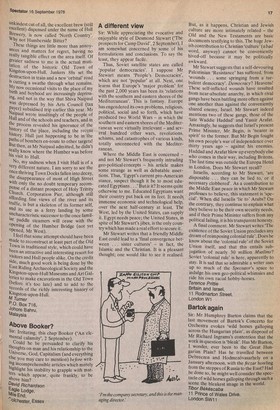A different view
Sir: While appreciating the evocative and enjoyable style of Desmond Stewart (`The prospects for Camp David', 2 September), I am somewhat concerned by some of his formulations and conclusions. To say the least, they appear facile. Thus, Soviet satellite states are called 'popular democracies'. I suppose Mr Stewart means 'People's Democracies', which are not 'popular' at all. Next, one learns that Europe's 'major problem' for the past 2,000 years has been its 'relations with the southern and eastern shores of the Mediterranean'. This is fantasy. Europe has engendered its own problems, religious, political, social and so forth, which have produced two World Wars — in which the southern and eastern shores of the Mediterranean were virtually irrelevant — and several hundred other wars, revolutions, schisms, and catastrophes of various kinds, totally unconnected with the Mediterranean.
Where the Middle East is concerned — and not Mr Stewart's frequently intruding geo-political concepts — his article makes some strange as well as debatable assertions. Thus, 'Egypt's current pro-American stance, suspect though it be to most educated Egyptians. . .' But is it? It seems quite otherwise to me. Educated Egyptians want their country put back on its feet. It needs. immense economic and technological help, over the next half-century at least. The West, led by the United States, can supply it. Egypt needs peace; the United States, in spite of Mr Stewart's jibes, is the only country which has made a real effort to secure it.
Mr Stewart writes that a friendly Middle East could lead to a 'final convergence bet ween . . . sister cultures' — in fact, the Islamic and the Christian. It is a pleasant thought; one would like to see it realised. But, as it happens, Christian and Jewish culture are more intimately related — the Old and the New Testaments are basic documents testifying to this. The huge Jewish contribution to Christian 'culture' (a bad word, anyway) cannot be conveniently hived-off because it may be politically awkward.
Mr Stewart suggests that a self-devouring Palestinian 'Resistance' has suffered, from 'wounds . . . some springing from a turbulent democracy'. Democracy? Heavens! These self-inflicted wounds have resulted from near-absolute anarchy, in which rival gangs have been battling more often against one another than against the conveniently shared enemy, Israel. Mr Stewart indeed mentions two of these gangs, those of the 'late Waddie Haddad' and Yassir Arafat. Amazingly, he suggests that Israel's present Prime Minister, Mr Begin, is 'nearer in spirit' to the former. But Mr Begin fought his own people's war of independence over thirty years ago — against his enemies. Haddad and Arafat blow up everybody else who comes in their way, including Britons. The last time was outside the Europa Hotel in London. Does Mr Stewart recall?
Israelis, according to Mr Stewart, 'are disposable . . . they can be lied to, or if necessary clobbered'. As a contribution to the Middle East peace in which Mr Stewart professes to believe, this statement is 'special'. When did Israelis lie to' Arabs? On the contrary, they continue to explain what they believe to be their own security needs, and if their Prime Minister suffers from any political failing, it is his transparent honesty.
A final comment. Mr Stewart writes 'The existence of the Soviet Union precludes any dream of reimposing colonial rule'. Does he know about the 'colonial rule' of the Soviet Union itself, and that this entails subjugation of nearly 30 million Muslims? Soviet 'colonial rule' is here, apparently to stay. It is sad that so admirable a writer uses up so much of the Spectator's space to indulge his own geo-political whimsies and ride his own racial hobby-horses.
Terence Prittie Britain and Israel, 11 Rodmarton Street, London W1


































 Previous page
Previous page